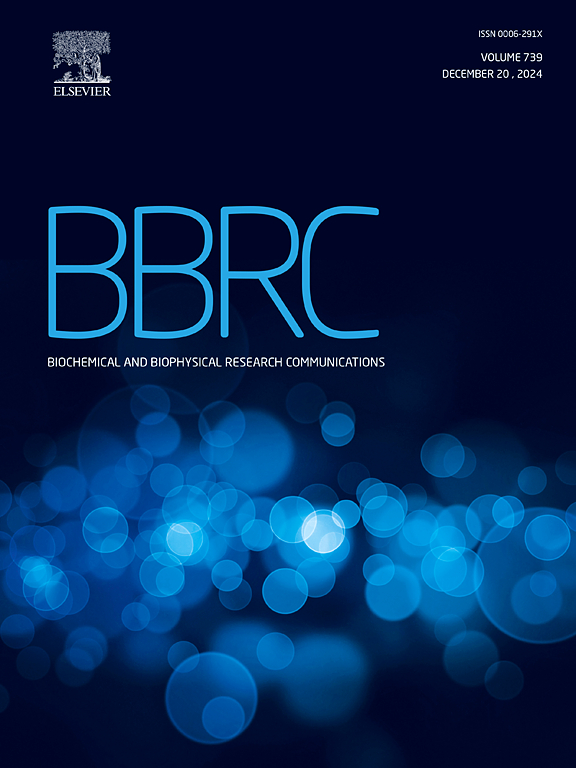IRAK-M regulates NTHi-induced inflammation via JNK and NF-κB signal pathways
IF 2.2
3区 生物学
Q3 BIOCHEMISTRY & MOLECULAR BIOLOGY
Biochemical and biophysical research communications
Pub Date : 2025-06-18
DOI:10.1016/j.bbrc.2025.152229
引用次数: 0
Abstract
Purpose
Nontypeable Haemophilus influenzae (NTHi) is a causative agent of acute exacerbations in chronic lung conditions. Despite antibiotic administration, unresolved hyperinflammation underscores the urgent need to identify host-directed immunomodulatory targets. The bronchial mucosa serves as a primary site for infection initiation and propagation. This study aims to investigate the role of airway-expressed interleukin-1 receptor-associated kinase M (IRAK-M) in modulating NTHi-induced lung inflammation and its potential mechanisms.
Methods
We examined the expression of IRAK-M and TLR4 in lung epithelial cells and macrophages following NTHi infection. IRAK-M was silenced or overexpressed to assess its impact on cytokine production. In vitro investigations, JNK and NF-κB inhibitors were applied to test whether IRAK-M-mediated inflammation was partly dependent on these pathways. In vivo, the effects of JNK and NF-κB inhibitors were evaluated in NTHi-infected mice.
Results
NTHi infection upregulated IRAK-M and TLR4 expression in both lung epithelial cells and macrophages. Upon NTHi stimulation, inflammatory responses were enhanced by IRAK-M overexpression or suppressed by IRAK-M silencing in lung-resident and immune cells. IRAK-M overexpression led to overactivation of JNK and NF-κB pathways. Inhibition of these pathways counteracted IRAK-M-induced inflammatory responses. In vivo, JNK and NF-κB inhibitors alleviated lung inflammation, and JNK inhibitors improved survival in NTHi-infected mice.
Conclusion
IRAK-M regulates NTHi-induced inflammation possibly through NF-κB and JNK signaling pathways. Modulation of IRAK-M and its downstream JNK and NF-κB signaling pathways might represent a novel therapeutic strategy for controlling NTHi-induced inflammation.
IRAK-M通过JNK和NF-κB信号通路调节nthi诱导的炎症
不可分型流感嗜血杆菌(NTHi)是慢性肺部疾病急性加重的病原体。尽管使用了抗生素,但未解决的过度炎症强调了迫切需要确定宿主定向的免疫调节靶点。支气管粘膜是感染发生和传播的主要部位。本研究旨在探讨气道表达的白细胞介素-1受体相关激酶M (IRAK-M)在调节nthi诱导的肺部炎症中的作用及其潜在机制。方法检测NTHi感染后肺上皮细胞和巨噬细胞中IRAK-M和TLR4的表达。IRAK-M被沉默或过表达以评估其对细胞因子产生的影响。在体外研究中,使用JNK和NF-κB抑制剂来测试irak -m介导的炎症是否部分依赖于这些途径。在体内,对nthi感染小鼠评价JNK和NF-κB抑制剂的作用。结果snthi感染可上调肺上皮细胞和巨噬细胞中IRAK-M和TLR4的表达。在NTHi刺激下,在肺驻留细胞和免疫细胞中,IRAK-M过表达增强了炎症反应,IRAK-M沉默抑制了炎症反应。IRAK-M过表达导致JNK和NF-κB通路过度激活。抑制这些通路可抵消irak - m诱导的炎症反应。在体内,JNK和NF-κB抑制剂减轻了nthi感染小鼠的肺部炎症,JNK抑制剂提高了nthi感染小鼠的存活率。结论irak - m可能通过NF-κB和JNK信号通路调控nthi诱导的炎症反应。调控IRAK-M及其下游JNK和NF-κB信号通路可能是控制nthi诱导炎症的一种新的治疗策略。
本文章由计算机程序翻译,如有差异,请以英文原文为准。
求助全文
约1分钟内获得全文
求助全文
来源期刊
CiteScore
6.10
自引率
0.00%
发文量
1400
审稿时长
14 days
期刊介绍:
Biochemical and Biophysical Research Communications is the premier international journal devoted to the very rapid dissemination of timely and significant experimental results in diverse fields of biological research. The development of the "Breakthroughs and Views" section brings the minireview format to the journal, and issues often contain collections of special interest manuscripts. BBRC is published weekly (52 issues/year).Research Areas now include: Biochemistry; biophysics; cell biology; developmental biology; immunology
; molecular biology; neurobiology; plant biology and proteomics

 求助内容:
求助内容: 应助结果提醒方式:
应助结果提醒方式:


